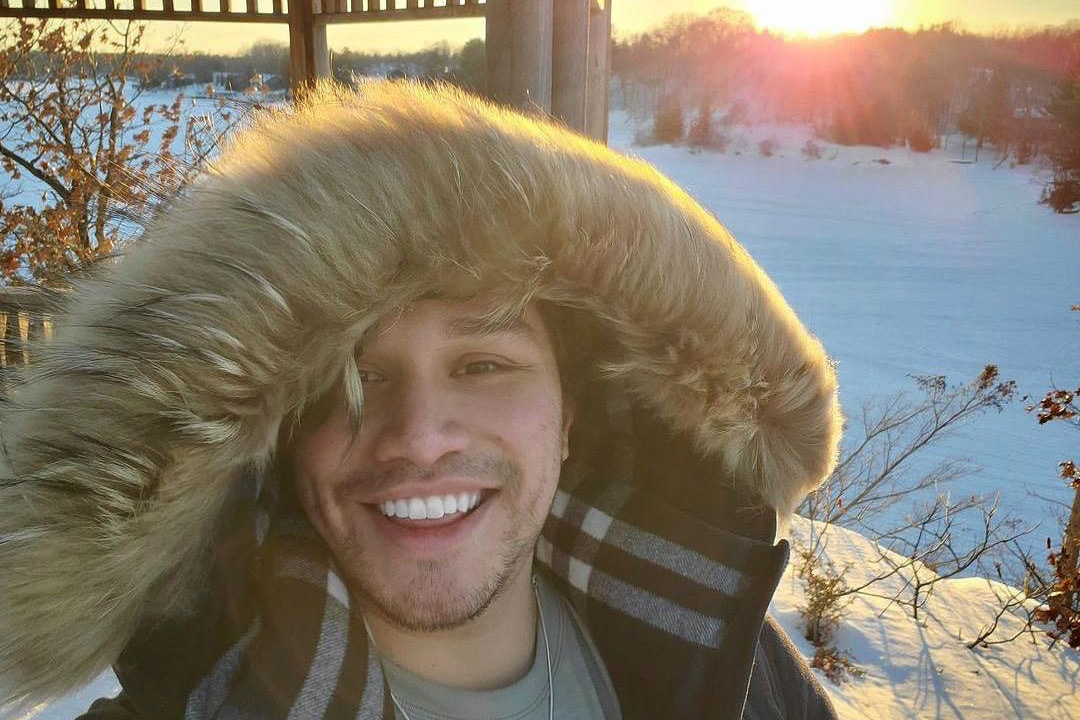
SENS graduate makes most of remote learning opportunity
Born and raised in Toronto, Diego Orellano worked in the retail sector throughout his undergraduate degree in biology and continued working with a luxury brand after graduation.
By Megan Evans“I want to be careful about saying this,” Orellano said, “because I know the pandemic has been hard for so many people, and I don’t want to take away from that. But for me, it’s been life-changing in a good way.”
In the early months of the pandemic the retail sector was hit particularly hard and despite his position as a manager, Orellano saw limited opportunities for future growth.
“I think, because of my biology background, I have a personal philosophy that you need to adapt to the situation in front of you to if you want to flourish and be successful—so that’s the attitude I took at the start of COVID, that I needed to adapt and find something new to do,” said the new graduate of the School of Environment and Sustainability (SENS) at the University of Saskatchewan (USask). “It was the push I needed to change my life, so I started looking at graduate programs and tried to figure out what I wanted to do besides retail.”
Pandemic lockdowns and travel restrictions made moving somewhere to begin studies in person an unlikely option, and he began looking for an online degree program that would help him pivot into a new career. After choosing the Master of Water Security program at USask, Orellano was a little worried about the transition from working to full-time studies in an online environment.
“I finished my undergrad seven years ago, so I wasn’t sure how it would go. The first couple of weeks were pretty intense and it was difficult to get back into studying,” he said. “There were some moments in the beginning where I asked myself if I had made the right choice, or if I should withdraw from the program. But I approached my studies like I would a job; I set hours for myself to keep on top of everything, and after the first few weeks I got the hang of it. I think it helped that with COVID, you have less of a social life, so I didn’t have as many distractions.”
As for the rest of the program, Orellano was surprised by how much engagement and community he found in an online program.
“I felt an immediate sense of community, despite it being remote, which was shocking for me. There were lots of chats and WhatsApp groups with classmates, so it was easy to collaborate on assignments and feel like you were part of the group,” he said.
“I felt like my instructors really cared if we understood the content and interacted with us as people, not a student ID number. Dr. (Andrew) Ireson (PhD), the program director, was very approachable, kind, and very present throughout the program, not just during his course. He was always available for support and guidance despite having so many responsibilities and even offered to look over my resume when applying for jobs. He truly cares about his students and their success in his program.”
After finishing the program at the end of August, Orellano was able to move from his studies right into a contract position as a research technician at Ryerson University, working on COVID-19 wastewater research.
“Retail gave me a lot of skills that have been useful in my new role here,” said Orellano, whose graduation is officially marked by USask’s Fall Convocation online celebration on Nov. 10. “I am always thinking about the end user, which helps me from a technical and programming side. The foresight to anticipate people’s needs was something I was always expected to do in retail, but I’m enjoying my new career 1,000 times more. I’m happy to be somewhere that I can do something useful for society and the world.”
Orellano was a welcome addition to the SENS’ master’s program, according to the program’s director.
“It was a real pleasure to teach and supervise Diego in the MWS program,” said Ireson, an associate professor in SENS. “I was impressed by how engaged he was in the online courses and discussions. His enthusiasm and abilities will take him far. He very quickly found an excellent job in hydrological data analysis after finishing the program, and I am sure he has a promising and exciting career ahead of him.”
This fall, 926 students are expected to graduate from USask with 939 degrees, diplomas and certificates. These graduates join a century-old community of close to 165,000 alumni worldwide whose contributions are helping to shape our world. Due to the pandemic, in-person ceremonies will not be held. Instead, there are a variety of opportunities to celebrate. Learn more about the celebrations at students.usask.ca/usaskclassof2021.
Article re-posted on .
View original article.

